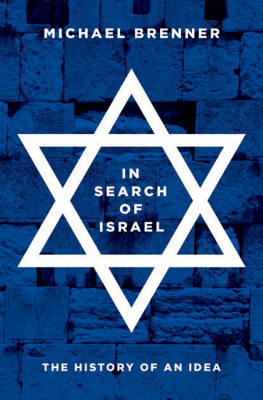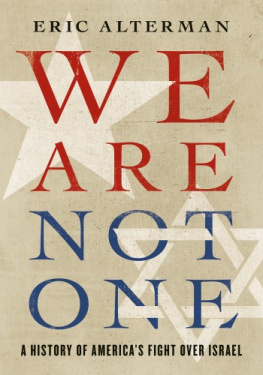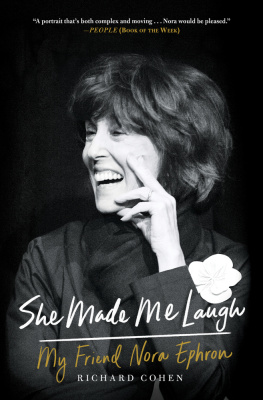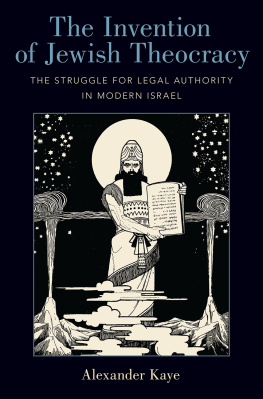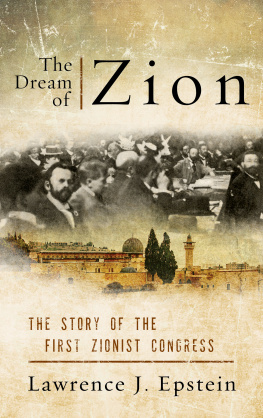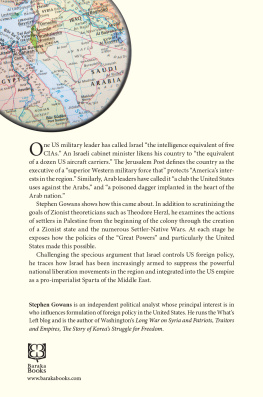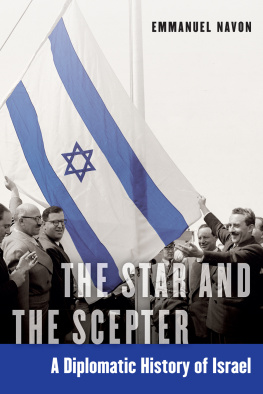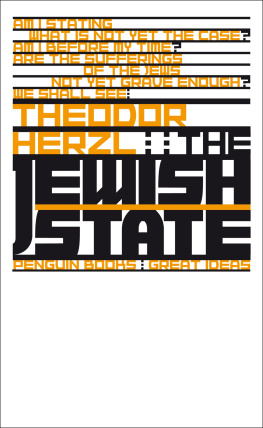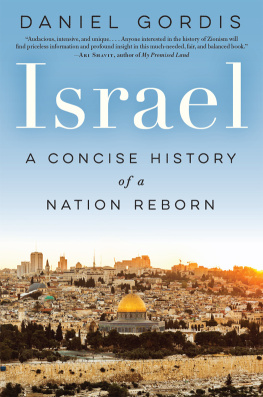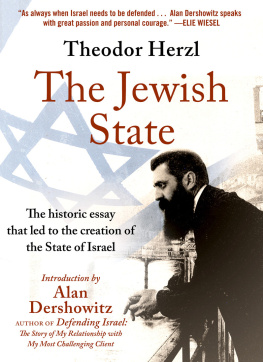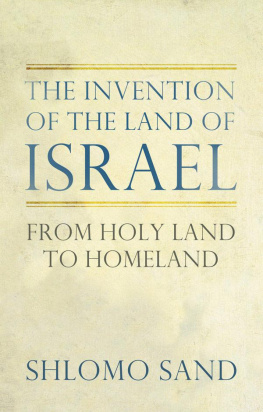IN SEARCH OF ISRAEL

THE HISTORY OF AN IDEA
MICHAEL BRENNER
PRINCETON UNIVERSITY PRESS
PRINCETON AND OXFORD
Copyright 2018 by Princeton University Press
This edition is a substantially revised translation of Israel: Traum und Wirklichkeit des Jdischen Staates by Michael Brenner, Verlag C.H. Beck oHG, Munchen 2016
Published by Princeton University Press,
41 William Street, Princeton, New Jersey 08540
In the United Kingdom: Princeton University Press,
6 Oxford Street, Woodstock, Oxfordshire OX20 1TR
press.princeton.edu
Jacket image: Western wall (Wailing Wall). Jerusalem, Israel. Roman Sigaev / Alamy Stock Photo
All Rights Reserved
The lyrics by Bob Dylan reproduced on page 177 are from Neighborhood Bully, copyright 1983 by Special Rider Music. All rights reserved. International copyright secured. Reprinted by permission.
Library of Congress Cataloguing-in-Publication Data
Names: Brenner, Michael, 1964 author.
Title: In Search of Israel : the history of an idea/Michael Brenner.
Other titles: Israel. English
Description: Princeton : Princeton University Press, 2018. | Includes bibliographical references and index.
Identifiers: LCCN 2017037393 | ISBN 9780691179285 (hardcover : alk. paper)
Subjects: LCSH: Israel. | IsraelHistory. | JudaismIsrael.
Classification: LCC DS125.5 .B7413 2018 | DDC 956.9405dc23 LC record available at https://lccn.loc.gov/2017037393
British Library Cataloging-in-Publication Data is available
This book has been composed in Sabon Next and Gotham
Printed on acid-free paper.
Printed in the United States of America
10 9 8 7 6 5 4 3 2 1
To my daughter Simone,
who helped me explore new sides of Israel
CONTENTS
ILLUSTRATIONS AND MAPS
All maps have been prepared for this book, and are copyright Peter Palm, Berlin/Germany
CHAPTER 1 |
CHAPTER 2 |
CHAPTER 3 |
CHAPTER 4 |
. |
CHAPTER 5 |
CHAPTER 6 |
CONCLUSION |
ACKNOWLEDGMENTS
Living in two countries and writing about a third encourages continuous reflection on the specific characteristics of different societies. I am grateful to my German publisher, C. H. Beck, and especially to Wolfgang Beck and Ulrich Nolte, for insisting that I write an earlier version of this book despite my initial hesitations, and I am just as grateful to Princeton Universitys Brigitta van Rheinberg for insisting that I write a substantially different book for an English-reading audience. It has been a real pleasure to work with Princeton University Press once again, where Amanda Peery and Debbie Tegarden have assisted me in various stages of turning my manuscript into a book. My copyeditor Eva Jaunzems made invaluable contributions to improve the final shape of this book.
My colleagues both at Ludwig Maximilian University in Munich and at American University in Washington, DC, have provided substantial input from the early stages of the German edition to the last stages of the English edition. Directing two quite different centers for Israel Studies in Munich and Washington, and serving on the board of yet two other academic centers in Israel have taught me to view the Jewish state from a variety of angles both from inside and outside. In Washington, I am indebted to my colleagues Pamela Nadell, Max Paul Friedman, Lisa Leff, and Guy Ziv, who have commented on various parts of my project and have been supportive in so many other ways. Lillian Abensohn has been the kindest and most generous donor any holder of a named chair can imagine, and her insight as an academic herself into Israeli society and Jewish literature have helped me gain new perspectives into my subject matter.
A new initiative of American Universitys College of Arts and Sciences supported the last stage of this book manuscript by providing me with a book incubator. Thanks to Dean Peter Starrs and Associate Dean U. J. Sofias support, I was able to gather some of my most esteemed colleagues for an intensive and extremely stimulating meeting, which helped to shape the final form of the manuscript. Alon Confino, Arie Dubnow, Yoav Gelber, James Loeffler, Yoram Peri, Derek Penslar, and Daniel Schwartz were extremely generous with their time and their comments, reading the whole manuscript critically and discussing it for an entire day in the most pleasant critical spirit.
In Munich, my colleagues Noam Zadoff, Mirjam Zadoff, Daniel Mahla, and Philipp Lenhard, as well as our visiting professors from Israel, Shlomo Ben-Ami and Natan Sznaider, all provided valuable suggestions to improve the original German edition of the book. I am grateful for having been invited as a visiting professor to the University of Haifa at an earlier stage and for continuing to serve on various committees in different institutions. My special thanks go to Eli Salzberger and Fania Oz-Salzberger from the University of Haifa and to Yfaat Weiss from the Hebrew University in Jerusalem. My long conversations with them have left their imprint in this book as well. Dimitry Shumsky in Jerusalem has read and commented on the manuscript extensively, as has John Efron in Berkeley and Michael Meyer in Cincinnati.
I would also like to thank three graduate students who provided indispensable help in the search for sources and with the editing of the text: Dominik Peters and Julia Schneidawind in Munich, and Omer Kaufman in Washington. Librarian Ann Brener never despaired of finding new and ever more obscure pamphlets in the bottomless treasure chambers of the Library of Congress, in whose beautiful reading rooms a good part of this book was written.
As always, my most profound thanks go to my family. My daughter Simone, to whom this book is dedicated, shares with me an inside and an outside perspective on Israel, and showed me parts of Tel Aviv I would have been too old to explore by myself. My wife, Michelle Engert, took me on many imaginary walks through endless versions of this manuscript, inspired me to write yet another version, and made sure that I kept in mind the readers of the book. Many ideas in the book were born in our real walks, during which I gained a totally new appreciation for Clio, the muse of history.
IN SEARCH OF ISRAEL
INTRODUCTION
A STATE (UN)LIKE ANY OTHER STATE
Now appoint for us a king to judge us like all the nations.
SAMUEL 8:5
The eminent Oxford philosopher Isaiah Berlin took great pleasure in telling the story of a party he attended in the 1930s where the later president of the State of Israel, Chaim Weizmann, then the leader of the World Zionist Organization, was asked by an aristocratic British lady admirer, Dr. Weizmann, I do not understand. You are a member of the most cultured, civilized, brilliant and cosmopolitan people in history and you want to give it all up to becomeAlbania? According to Isaiah Berlin, Weizmann pondered thoughtfully and slowly on the question, then his face lit up like a light bulb. Yes! he exclaimed: Albania! Albania!
To become a people like any other
Over
The sociologist Zygmunt Bauman called this phenomenon allosemitism. In contrast to the negative antisemitism and the positive philosemitism, allosemitism, which is based on the Greek word for other, simply refers to the practice of setting the Jews apart as people radically different
The image of the Jews as the other was of course used by Jews themselves as well, and this from earliest times. It originates with the biblical notion of a chosen people and is repeated in various forms throughout the books of the Bible and later in rabbinical literature and Jewish liturgy. The daily
Next page
